Organisational Analysis Assignment: Analysing Research Papers
VerifiedAdded on 2023/01/18
|9
|2831
|76
Homework Assignment
AI Summary
This assignment analyzes four research papers related to organisational analysis. The first paper, by Tata and Prasad (2015), examines the impact of national cultural values on sustainability beliefs and organisational initiatives, exploring how cultural differences influence sustainability goals and practices. The second paper, by Powel and Osborne (2015), investigates the role of marketing in sustainable social enterprises, considering the tensions between economic and social objectives and proposing a new model integrating marketing and sustainability. The third paper, by Cho, Laine, Roberts, and Rodrigue (2019), discusses organised hypocrisy and sustainability reporting, addressing the discrepancies between corporate communication and actions in the context of sustainability. The final paper, by Atkins, Thomson, and Maroun (2015), explores the potential of accounting and accountability to promote sustainability, proposing a utopian vision of a sustainable world through integrated reporting and environmental awareness. Each paper is critically analysed in terms of its arguments, methods, and alignment with organisational analysis rationales.

Student Name:
Student ID:
Student ID:
Paraphrase This Document
Need a fresh take? Get an instant paraphrase of this document with our AI Paraphraser
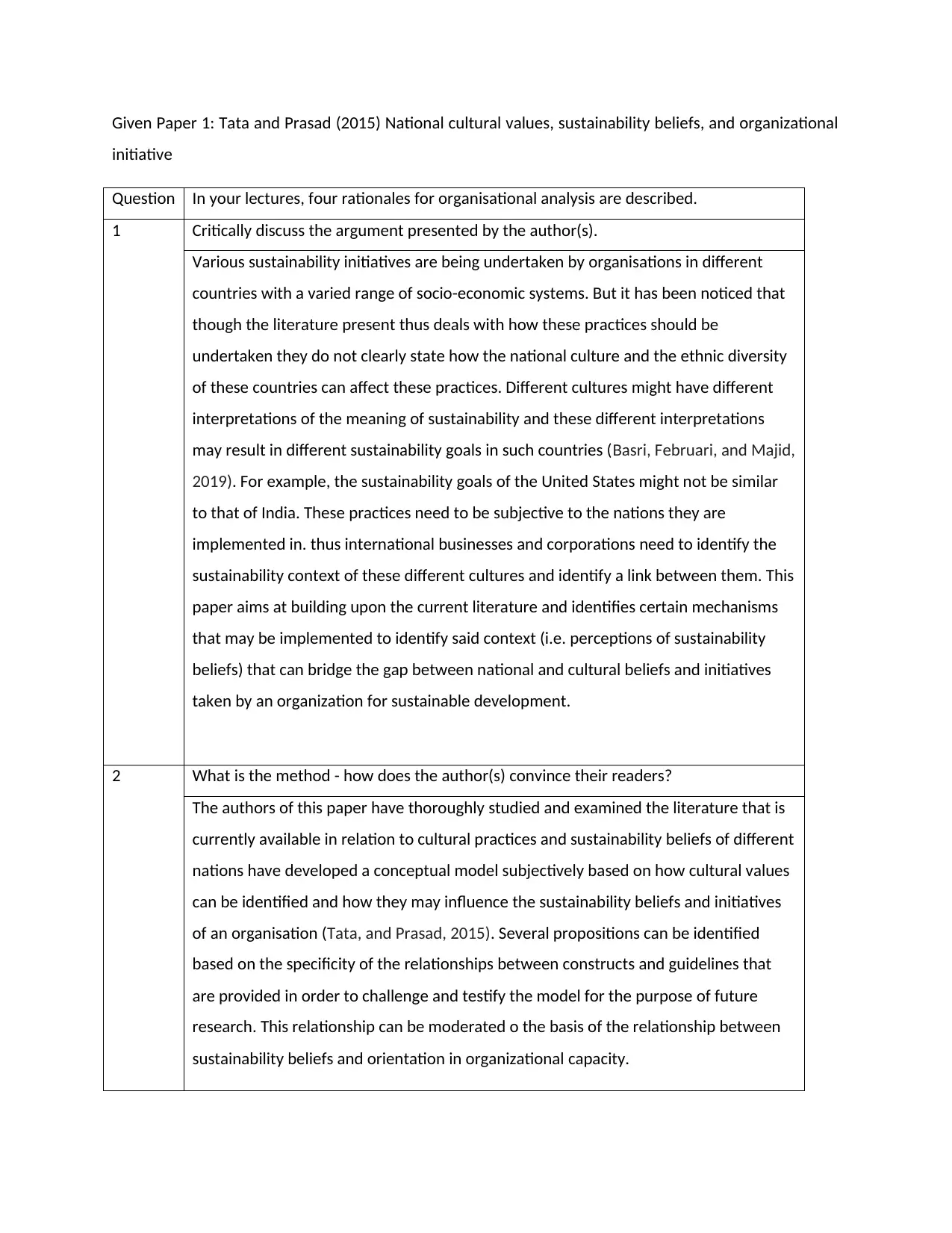
Given Paper 1: Tata and Prasad (2015) National cultural values, sustainability beliefs, and organizational
initiative
Question In your lectures, four rationales for organisational analysis are described.
1 Critically discuss the argument presented by the author(s).
Various sustainability initiatives are being undertaken by organisations in different
countries with a varied range of socio-economic systems. But it has been noticed that
though the literature present thus deals with how these practices should be
undertaken they do not clearly state how the national culture and the ethnic diversity
of these countries can affect these practices. Different cultures might have different
interpretations of the meaning of sustainability and these different interpretations
may result in different sustainability goals in such countries (Basri, Februari, and Majid,
2019). For example, the sustainability goals of the United States might not be similar
to that of India. These practices need to be subjective to the nations they are
implemented in. thus international businesses and corporations need to identify the
sustainability context of these different cultures and identify a link between them. This
paper aims at building upon the current literature and identifies certain mechanisms
that may be implemented to identify said context (i.e. perceptions of sustainability
beliefs) that can bridge the gap between national and cultural beliefs and initiatives
taken by an organization for sustainable development.
2 What is the method - how does the author(s) convince their readers?
The authors of this paper have thoroughly studied and examined the literature that is
currently available in relation to cultural practices and sustainability beliefs of different
nations have developed a conceptual model subjectively based on how cultural values
can be identified and how they may influence the sustainability beliefs and initiatives
of an organisation (Tata, and Prasad, 2015). Several propositions can be identified
based on the specificity of the relationships between constructs and guidelines that
are provided in order to challenge and testify the model for the purpose of future
research. This relationship can be moderated o the basis of the relationship between
sustainability beliefs and orientation in organizational capacity.
initiative
Question In your lectures, four rationales for organisational analysis are described.
1 Critically discuss the argument presented by the author(s).
Various sustainability initiatives are being undertaken by organisations in different
countries with a varied range of socio-economic systems. But it has been noticed that
though the literature present thus deals with how these practices should be
undertaken they do not clearly state how the national culture and the ethnic diversity
of these countries can affect these practices. Different cultures might have different
interpretations of the meaning of sustainability and these different interpretations
may result in different sustainability goals in such countries (Basri, Februari, and Majid,
2019). For example, the sustainability goals of the United States might not be similar
to that of India. These practices need to be subjective to the nations they are
implemented in. thus international businesses and corporations need to identify the
sustainability context of these different cultures and identify a link between them. This
paper aims at building upon the current literature and identifies certain mechanisms
that may be implemented to identify said context (i.e. perceptions of sustainability
beliefs) that can bridge the gap between national and cultural beliefs and initiatives
taken by an organization for sustainable development.
2 What is the method - how does the author(s) convince their readers?
The authors of this paper have thoroughly studied and examined the literature that is
currently available in relation to cultural practices and sustainability beliefs of different
nations have developed a conceptual model subjectively based on how cultural values
can be identified and how they may influence the sustainability beliefs and initiatives
of an organisation (Tata, and Prasad, 2015). Several propositions can be identified
based on the specificity of the relationships between constructs and guidelines that
are provided in order to challenge and testify the model for the purpose of future
research. This relationship can be moderated o the basis of the relationship between
sustainability beliefs and orientation in organizational capacity.
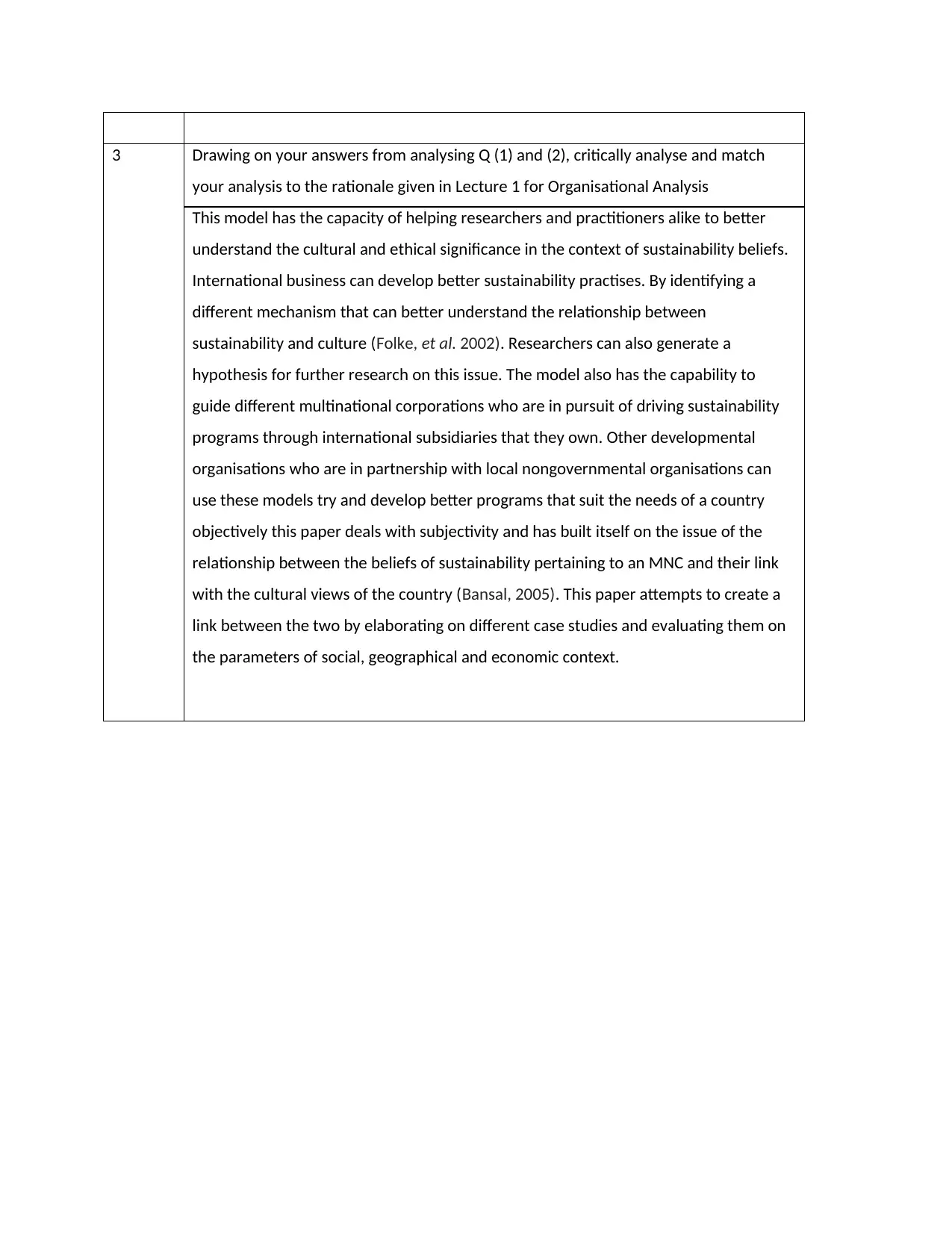
3 Drawing on your answers from analysing Q (1) and (2), critically analyse and match
your analysis to the rationale given in Lecture 1 for Organisational Analysis
This model has the capacity of helping researchers and practitioners alike to better
understand the cultural and ethical significance in the context of sustainability beliefs.
International business can develop better sustainability practises. By identifying a
different mechanism that can better understand the relationship between
sustainability and culture (Folke, et al. 2002). Researchers can also generate a
hypothesis for further research on this issue. The model also has the capability to
guide different multinational corporations who are in pursuit of driving sustainability
programs through international subsidiaries that they own. Other developmental
organisations who are in partnership with local nongovernmental organisations can
use these models try and develop better programs that suit the needs of a country
objectively this paper deals with subjectivity and has built itself on the issue of the
relationship between the beliefs of sustainability pertaining to an MNC and their link
with the cultural views of the country (Bansal, 2005). This paper attempts to create a
link between the two by elaborating on different case studies and evaluating them on
the parameters of social, geographical and economic context.
your analysis to the rationale given in Lecture 1 for Organisational Analysis
This model has the capacity of helping researchers and practitioners alike to better
understand the cultural and ethical significance in the context of sustainability beliefs.
International business can develop better sustainability practises. By identifying a
different mechanism that can better understand the relationship between
sustainability and culture (Folke, et al. 2002). Researchers can also generate a
hypothesis for further research on this issue. The model also has the capability to
guide different multinational corporations who are in pursuit of driving sustainability
programs through international subsidiaries that they own. Other developmental
organisations who are in partnership with local nongovernmental organisations can
use these models try and develop better programs that suit the needs of a country
objectively this paper deals with subjectivity and has built itself on the issue of the
relationship between the beliefs of sustainability pertaining to an MNC and their link
with the cultural views of the country (Bansal, 2005). This paper attempts to create a
link between the two by elaborating on different case studies and evaluating them on
the parameters of social, geographical and economic context.
⊘ This is a preview!⊘
Do you want full access?
Subscribe today to unlock all pages.

Trusted by 1+ million students worldwide
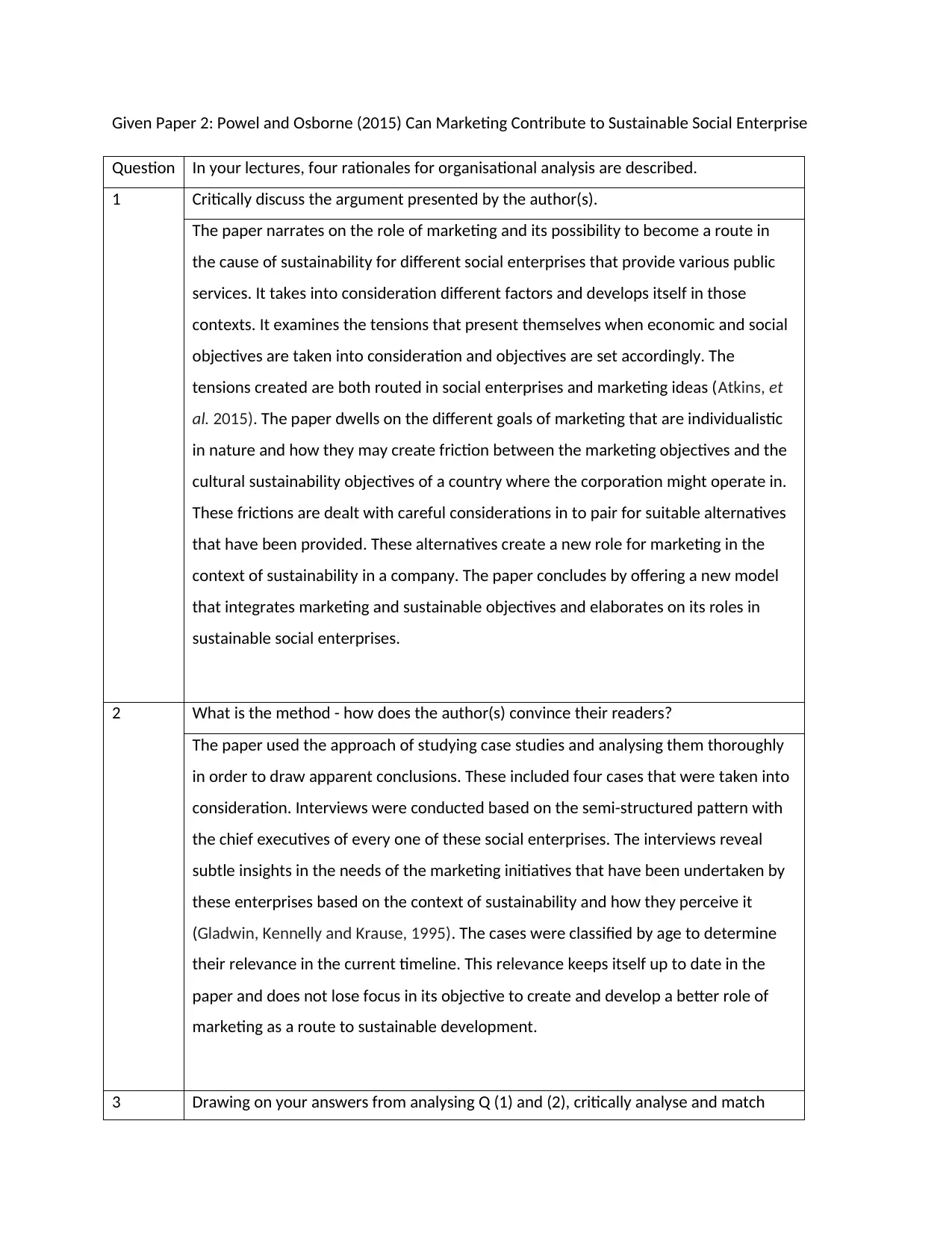
Given Paper 2: Powel and Osborne (2015) Can Marketing Contribute to Sustainable Social Enterprise
Question In your lectures, four rationales for organisational analysis are described.
1 Critically discuss the argument presented by the author(s).
The paper narrates on the role of marketing and its possibility to become a route in
the cause of sustainability for different social enterprises that provide various public
services. It takes into consideration different factors and develops itself in those
contexts. It examines the tensions that present themselves when economic and social
objectives are taken into consideration and objectives are set accordingly. The
tensions created are both routed in social enterprises and marketing ideas (Atkins, et
al. 2015). The paper dwells on the different goals of marketing that are individualistic
in nature and how they may create friction between the marketing objectives and the
cultural sustainability objectives of a country where the corporation might operate in.
These frictions are dealt with careful considerations in to pair for suitable alternatives
that have been provided. These alternatives create a new role for marketing in the
context of sustainability in a company. The paper concludes by offering a new model
that integrates marketing and sustainable objectives and elaborates on its roles in
sustainable social enterprises.
2 What is the method - how does the author(s) convince their readers?
The paper used the approach of studying case studies and analysing them thoroughly
in order to draw apparent conclusions. These included four cases that were taken into
consideration. Interviews were conducted based on the semi-structured pattern with
the chief executives of every one of these social enterprises. The interviews reveal
subtle insights in the needs of the marketing initiatives that have been undertaken by
these enterprises based on the context of sustainability and how they perceive it
(Gladwin, Kennelly and Krause, 1995). The cases were classified by age to determine
their relevance in the current timeline. This relevance keeps itself up to date in the
paper and does not lose focus in its objective to create and develop a better role of
marketing as a route to sustainable development.
3 Drawing on your answers from analysing Q (1) and (2), critically analyse and match
Question In your lectures, four rationales for organisational analysis are described.
1 Critically discuss the argument presented by the author(s).
The paper narrates on the role of marketing and its possibility to become a route in
the cause of sustainability for different social enterprises that provide various public
services. It takes into consideration different factors and develops itself in those
contexts. It examines the tensions that present themselves when economic and social
objectives are taken into consideration and objectives are set accordingly. The
tensions created are both routed in social enterprises and marketing ideas (Atkins, et
al. 2015). The paper dwells on the different goals of marketing that are individualistic
in nature and how they may create friction between the marketing objectives and the
cultural sustainability objectives of a country where the corporation might operate in.
These frictions are dealt with careful considerations in to pair for suitable alternatives
that have been provided. These alternatives create a new role for marketing in the
context of sustainability in a company. The paper concludes by offering a new model
that integrates marketing and sustainable objectives and elaborates on its roles in
sustainable social enterprises.
2 What is the method - how does the author(s) convince their readers?
The paper used the approach of studying case studies and analysing them thoroughly
in order to draw apparent conclusions. These included four cases that were taken into
consideration. Interviews were conducted based on the semi-structured pattern with
the chief executives of every one of these social enterprises. The interviews reveal
subtle insights in the needs of the marketing initiatives that have been undertaken by
these enterprises based on the context of sustainability and how they perceive it
(Gladwin, Kennelly and Krause, 1995). The cases were classified by age to determine
their relevance in the current timeline. This relevance keeps itself up to date in the
paper and does not lose focus in its objective to create and develop a better role of
marketing as a route to sustainable development.
3 Drawing on your answers from analysing Q (1) and (2), critically analyse and match
Paraphrase This Document
Need a fresh take? Get an instant paraphrase of this document with our AI Paraphraser
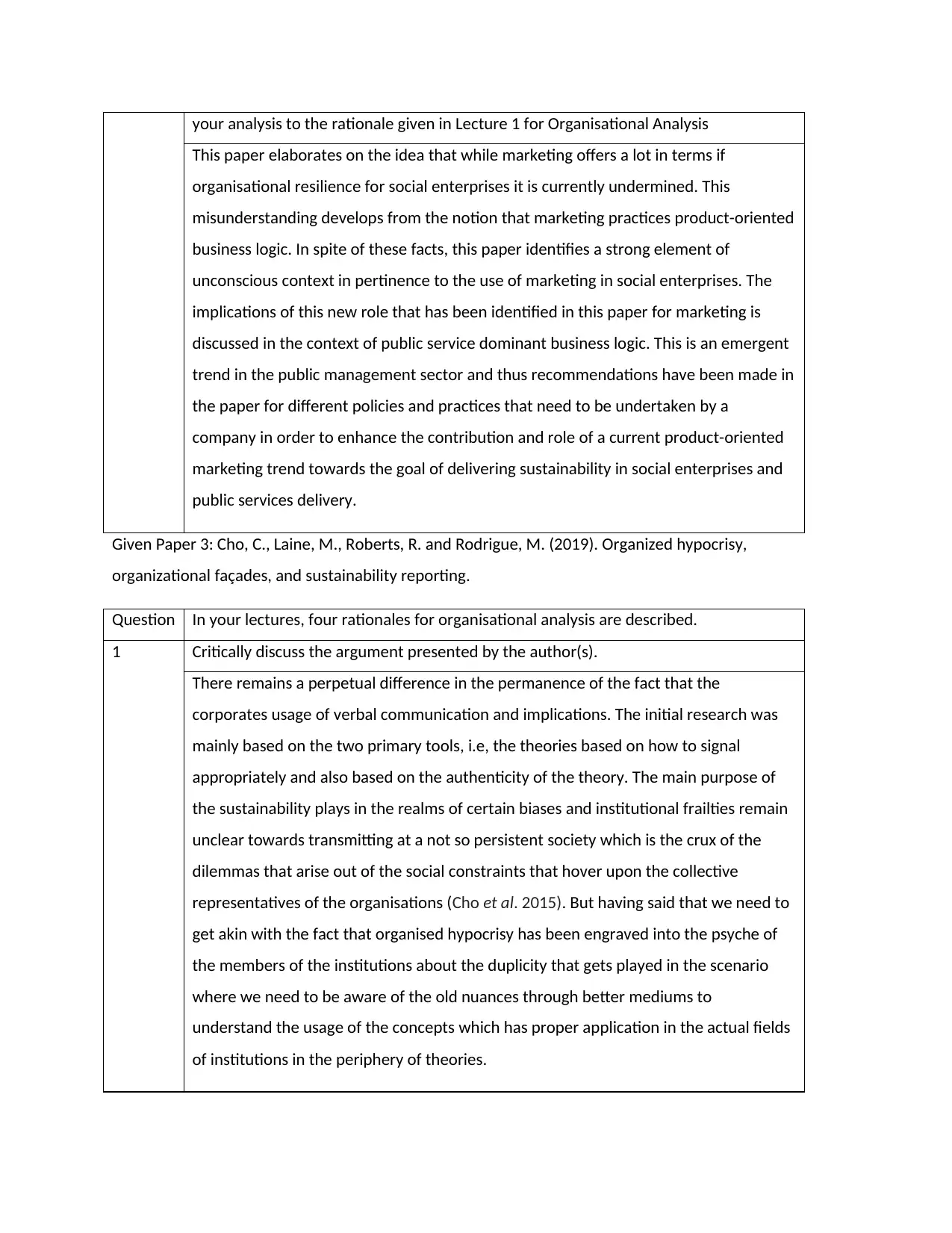
your analysis to the rationale given in Lecture 1 for Organisational Analysis
This paper elaborates on the idea that while marketing offers a lot in terms if
organisational resilience for social enterprises it is currently undermined. This
misunderstanding develops from the notion that marketing practices product-oriented
business logic. In spite of these facts, this paper identifies a strong element of
unconscious context in pertinence to the use of marketing in social enterprises. The
implications of this new role that has been identified in this paper for marketing is
discussed in the context of public service dominant business logic. This is an emergent
trend in the public management sector and thus recommendations have been made in
the paper for different policies and practices that need to be undertaken by a
company in order to enhance the contribution and role of a current product-oriented
marketing trend towards the goal of delivering sustainability in social enterprises and
public services delivery.
Given Paper 3: Cho, C., Laine, M., Roberts, R. and Rodrigue, M. (2019). Organized hypocrisy,
organizational façades, and sustainability reporting.
Question In your lectures, four rationales for organisational analysis are described.
1 Critically discuss the argument presented by the author(s).
There remains a perpetual difference in the permanence of the fact that the
corporates usage of verbal communication and implications. The initial research was
mainly based on the two primary tools, i.e, the theories based on how to signal
appropriately and also based on the authenticity of the theory. The main purpose of
the sustainability plays in the realms of certain biases and institutional frailties remain
unclear towards transmitting at a not so persistent society which is the crux of the
dilemmas that arise out of the social constraints that hover upon the collective
representatives of the organisations (Cho et al. 2015). But having said that we need to
get akin with the fact that organised hypocrisy has been engraved into the psyche of
the members of the institutions about the duplicity that gets played in the scenario
where we need to be aware of the old nuances through better mediums to
understand the usage of the concepts which has proper application in the actual fields
of institutions in the periphery of theories.
This paper elaborates on the idea that while marketing offers a lot in terms if
organisational resilience for social enterprises it is currently undermined. This
misunderstanding develops from the notion that marketing practices product-oriented
business logic. In spite of these facts, this paper identifies a strong element of
unconscious context in pertinence to the use of marketing in social enterprises. The
implications of this new role that has been identified in this paper for marketing is
discussed in the context of public service dominant business logic. This is an emergent
trend in the public management sector and thus recommendations have been made in
the paper for different policies and practices that need to be undertaken by a
company in order to enhance the contribution and role of a current product-oriented
marketing trend towards the goal of delivering sustainability in social enterprises and
public services delivery.
Given Paper 3: Cho, C., Laine, M., Roberts, R. and Rodrigue, M. (2019). Organized hypocrisy,
organizational façades, and sustainability reporting.
Question In your lectures, four rationales for organisational analysis are described.
1 Critically discuss the argument presented by the author(s).
There remains a perpetual difference in the permanence of the fact that the
corporates usage of verbal communication and implications. The initial research was
mainly based on the two primary tools, i.e, the theories based on how to signal
appropriately and also based on the authenticity of the theory. The main purpose of
the sustainability plays in the realms of certain biases and institutional frailties remain
unclear towards transmitting at a not so persistent society which is the crux of the
dilemmas that arise out of the social constraints that hover upon the collective
representatives of the organisations (Cho et al. 2015). But having said that we need to
get akin with the fact that organised hypocrisy has been engraved into the psyche of
the members of the institutions about the duplicity that gets played in the scenario
where we need to be aware of the old nuances through better mediums to
understand the usage of the concepts which has proper application in the actual fields
of institutions in the periphery of theories.
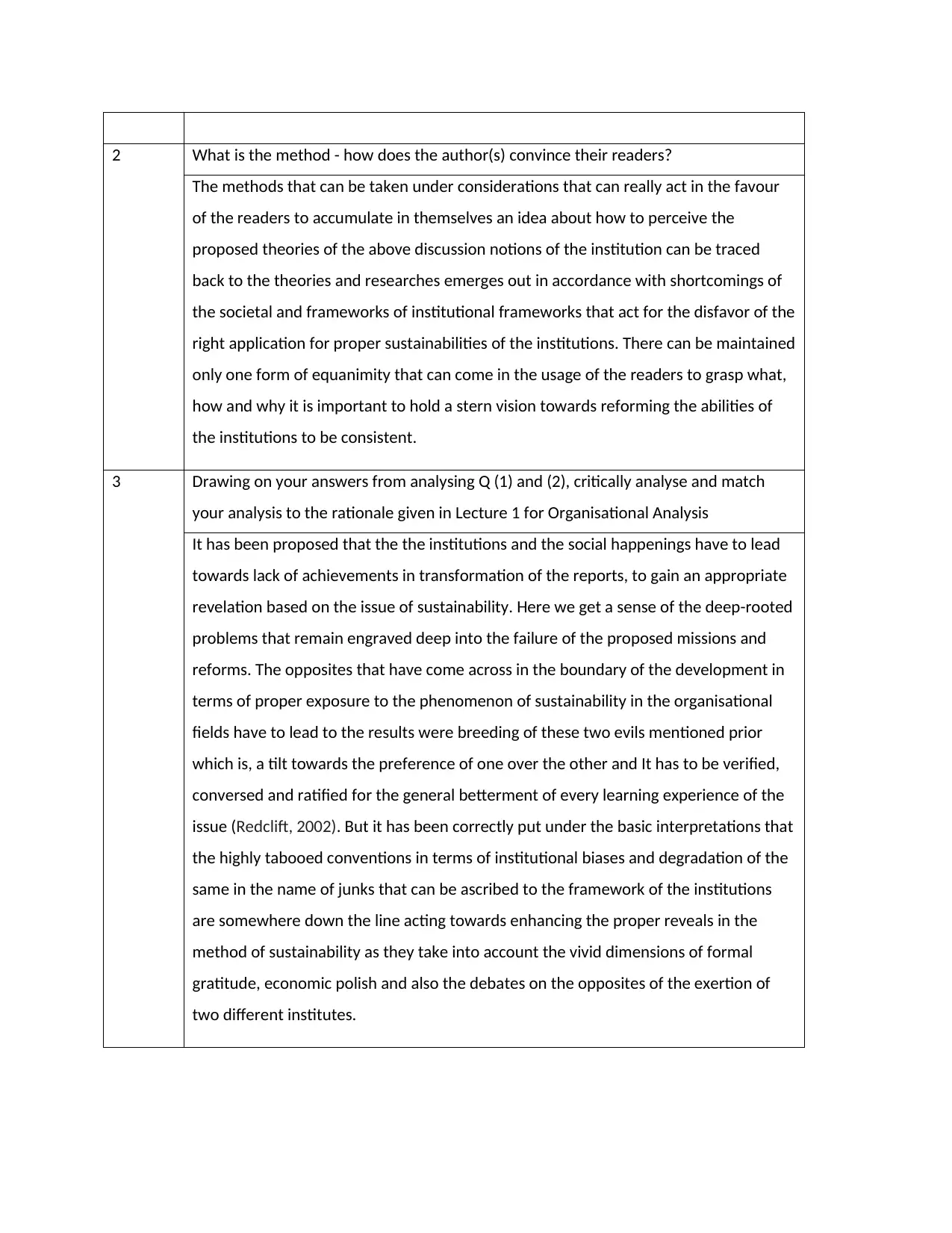
2 What is the method - how does the author(s) convince their readers?
The methods that can be taken under considerations that can really act in the favour
of the readers to accumulate in themselves an idea about how to perceive the
proposed theories of the above discussion notions of the institution can be traced
back to the theories and researches emerges out in accordance with shortcomings of
the societal and frameworks of institutional frameworks that act for the disfavor of the
right application for proper sustainabilities of the institutions. There can be maintained
only one form of equanimity that can come in the usage of the readers to grasp what,
how and why it is important to hold a stern vision towards reforming the abilities of
the institutions to be consistent.
3 Drawing on your answers from analysing Q (1) and (2), critically analyse and match
your analysis to the rationale given in Lecture 1 for Organisational Analysis
It has been proposed that the the institutions and the social happenings have to lead
towards lack of achievements in transformation of the reports, to gain an appropriate
revelation based on the issue of sustainability. Here we get a sense of the deep-rooted
problems that remain engraved deep into the failure of the proposed missions and
reforms. The opposites that have come across in the boundary of the development in
terms of proper exposure to the phenomenon of sustainability in the organisational
fields have to lead to the results were breeding of these two evils mentioned prior
which is, a tilt towards the preference of one over the other and It has to be verified,
conversed and ratified for the general betterment of every learning experience of the
issue (Redclift, 2002). But it has been correctly put under the basic interpretations that
the highly tabooed conventions in terms of institutional biases and degradation of the
same in the name of junks that can be ascribed to the framework of the institutions
are somewhere down the line acting towards enhancing the proper reveals in the
method of sustainability as they take into account the vivid dimensions of formal
gratitude, economic polish and also the debates on the opposites of the exertion of
two different institutes.
The methods that can be taken under considerations that can really act in the favour
of the readers to accumulate in themselves an idea about how to perceive the
proposed theories of the above discussion notions of the institution can be traced
back to the theories and researches emerges out in accordance with shortcomings of
the societal and frameworks of institutional frameworks that act for the disfavor of the
right application for proper sustainabilities of the institutions. There can be maintained
only one form of equanimity that can come in the usage of the readers to grasp what,
how and why it is important to hold a stern vision towards reforming the abilities of
the institutions to be consistent.
3 Drawing on your answers from analysing Q (1) and (2), critically analyse and match
your analysis to the rationale given in Lecture 1 for Organisational Analysis
It has been proposed that the the institutions and the social happenings have to lead
towards lack of achievements in transformation of the reports, to gain an appropriate
revelation based on the issue of sustainability. Here we get a sense of the deep-rooted
problems that remain engraved deep into the failure of the proposed missions and
reforms. The opposites that have come across in the boundary of the development in
terms of proper exposure to the phenomenon of sustainability in the organisational
fields have to lead to the results were breeding of these two evils mentioned prior
which is, a tilt towards the preference of one over the other and It has to be verified,
conversed and ratified for the general betterment of every learning experience of the
issue (Redclift, 2002). But it has been correctly put under the basic interpretations that
the highly tabooed conventions in terms of institutional biases and degradation of the
same in the name of junks that can be ascribed to the framework of the institutions
are somewhere down the line acting towards enhancing the proper reveals in the
method of sustainability as they take into account the vivid dimensions of formal
gratitude, economic polish and also the debates on the opposites of the exertion of
two different institutes.
⊘ This is a preview!⊘
Do you want full access?
Subscribe today to unlock all pages.

Trusted by 1+ million students worldwide
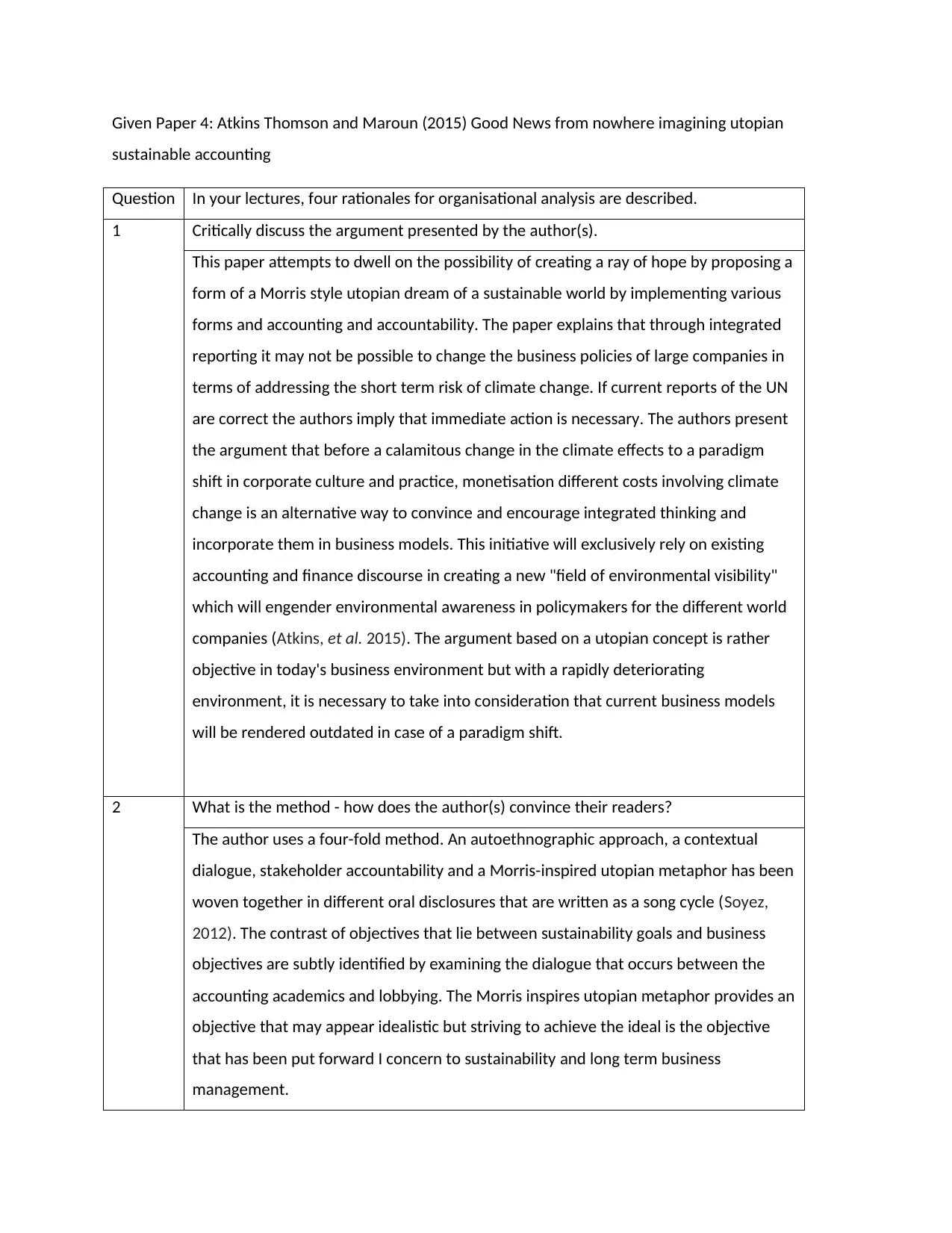
Given Paper 4: Atkins Thomson and Maroun (2015) Good News from nowhere imagining utopian
sustainable accounting
Question In your lectures, four rationales for organisational analysis are described.
1 Critically discuss the argument presented by the author(s).
This paper attempts to dwell on the possibility of creating a ray of hope by proposing a
form of a Morris style utopian dream of a sustainable world by implementing various
forms and accounting and accountability. The paper explains that through integrated
reporting it may not be possible to change the business policies of large companies in
terms of addressing the short term risk of climate change. If current reports of the UN
are correct the authors imply that immediate action is necessary. The authors present
the argument that before a calamitous change in the climate effects to a paradigm
shift in corporate culture and practice, monetisation different costs involving climate
change is an alternative way to convince and encourage integrated thinking and
incorporate them in business models. This initiative will exclusively rely on existing
accounting and finance discourse in creating a new "field of environmental visibility"
which will engender environmental awareness in policymakers for the different world
companies (Atkins, et al. 2015). The argument based on a utopian concept is rather
objective in today's business environment but with a rapidly deteriorating
environment, it is necessary to take into consideration that current business models
will be rendered outdated in case of a paradigm shift.
2 What is the method - how does the author(s) convince their readers?
The author uses a four-fold method. An autoethnographic approach, a contextual
dialogue, stakeholder accountability and a Morris-inspired utopian metaphor has been
woven together in different oral disclosures that are written as a song cycle (Soyez,
2012). The contrast of objectives that lie between sustainability goals and business
objectives are subtly identified by examining the dialogue that occurs between the
accounting academics and lobbying. The Morris inspires utopian metaphor provides an
objective that may appear idealistic but striving to achieve the ideal is the objective
that has been put forward I concern to sustainability and long term business
management.
sustainable accounting
Question In your lectures, four rationales for organisational analysis are described.
1 Critically discuss the argument presented by the author(s).
This paper attempts to dwell on the possibility of creating a ray of hope by proposing a
form of a Morris style utopian dream of a sustainable world by implementing various
forms and accounting and accountability. The paper explains that through integrated
reporting it may not be possible to change the business policies of large companies in
terms of addressing the short term risk of climate change. If current reports of the UN
are correct the authors imply that immediate action is necessary. The authors present
the argument that before a calamitous change in the climate effects to a paradigm
shift in corporate culture and practice, monetisation different costs involving climate
change is an alternative way to convince and encourage integrated thinking and
incorporate them in business models. This initiative will exclusively rely on existing
accounting and finance discourse in creating a new "field of environmental visibility"
which will engender environmental awareness in policymakers for the different world
companies (Atkins, et al. 2015). The argument based on a utopian concept is rather
objective in today's business environment but with a rapidly deteriorating
environment, it is necessary to take into consideration that current business models
will be rendered outdated in case of a paradigm shift.
2 What is the method - how does the author(s) convince their readers?
The author uses a four-fold method. An autoethnographic approach, a contextual
dialogue, stakeholder accountability and a Morris-inspired utopian metaphor has been
woven together in different oral disclosures that are written as a song cycle (Soyez,
2012). The contrast of objectives that lie between sustainability goals and business
objectives are subtly identified by examining the dialogue that occurs between the
accounting academics and lobbying. The Morris inspires utopian metaphor provides an
objective that may appear idealistic but striving to achieve the ideal is the objective
that has been put forward I concern to sustainability and long term business
management.
Paraphrase This Document
Need a fresh take? Get an instant paraphrase of this document with our AI Paraphraser
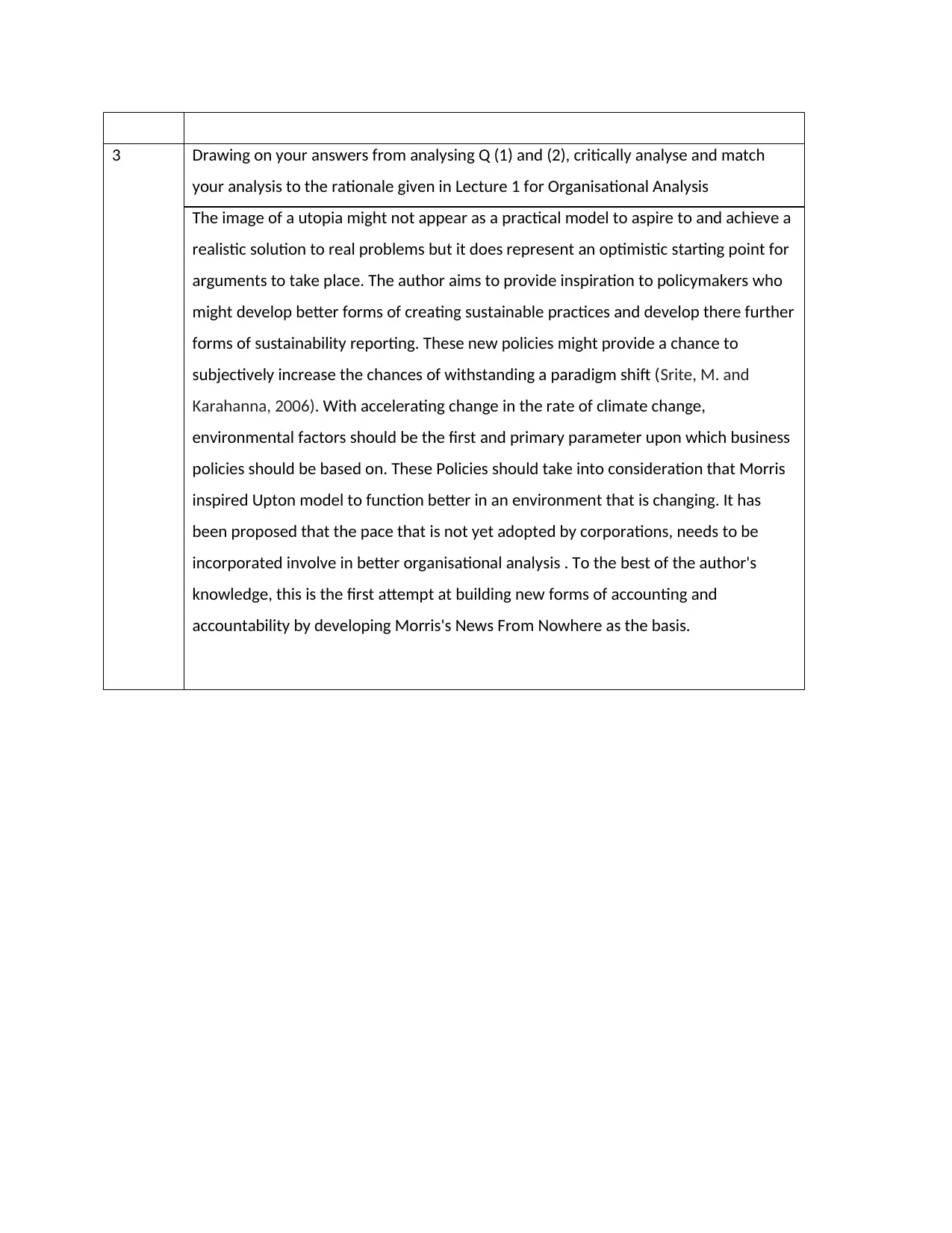
3 Drawing on your answers from analysing Q (1) and (2), critically analyse and match
your analysis to the rationale given in Lecture 1 for Organisational Analysis
The image of a utopia might not appear as a practical model to aspire to and achieve a
realistic solution to real problems but it does represent an optimistic starting point for
arguments to take place. The author aims to provide inspiration to policymakers who
might develop better forms of creating sustainable practices and develop there further
forms of sustainability reporting. These new policies might provide a chance to
subjectively increase the chances of withstanding a paradigm shift (Srite, M. and
Karahanna, 2006). With accelerating change in the rate of climate change,
environmental factors should be the first and primary parameter upon which business
policies should be based on. These Policies should take into consideration that Morris
inspired Upton model to function better in an environment that is changing. It has
been proposed that the pace that is not yet adopted by corporations, needs to be
incorporated involve in better organisational analysis . To the best of the author's
knowledge, this is the first attempt at building new forms of accounting and
accountability by developing Morris's News From Nowhere as the basis.
your analysis to the rationale given in Lecture 1 for Organisational Analysis
The image of a utopia might not appear as a practical model to aspire to and achieve a
realistic solution to real problems but it does represent an optimistic starting point for
arguments to take place. The author aims to provide inspiration to policymakers who
might develop better forms of creating sustainable practices and develop there further
forms of sustainability reporting. These new policies might provide a chance to
subjectively increase the chances of withstanding a paradigm shift (Srite, M. and
Karahanna, 2006). With accelerating change in the rate of climate change,
environmental factors should be the first and primary parameter upon which business
policies should be based on. These Policies should take into consideration that Morris
inspired Upton model to function better in an environment that is changing. It has
been proposed that the pace that is not yet adopted by corporations, needs to be
incorporated involve in better organisational analysis . To the best of the author's
knowledge, this is the first attempt at building new forms of accounting and
accountability by developing Morris's News From Nowhere as the basis.
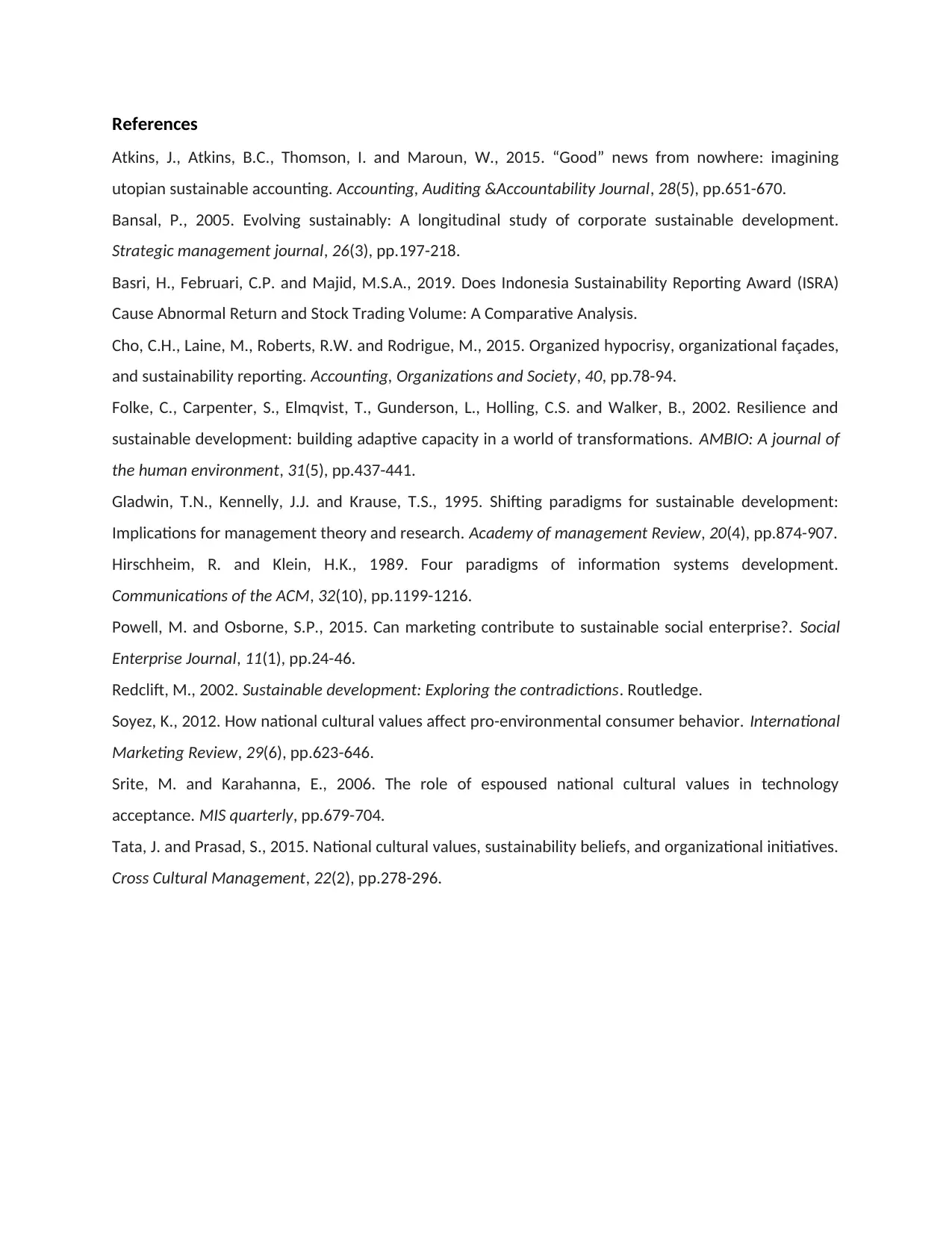
References
Atkins, J., Atkins, B.C., Thomson, I. and Maroun, W., 2015. “Good” news from nowhere: imagining
utopian sustainable accounting. Accounting, Auditing &Accountability Journal, 28(5), pp.651-670.
Bansal, P., 2005. Evolving sustainably: A longitudinal study of corporate sustainable development.
Strategic management journal, 26(3), pp.197-218.
Basri, H., Februari, C.P. and Majid, M.S.A., 2019. Does Indonesia Sustainability Reporting Award (ISRA)
Cause Abnormal Return and Stock Trading Volume: A Comparative Analysis.
Cho, C.H., Laine, M., Roberts, R.W. and Rodrigue, M., 2015. Organized hypocrisy, organizational façades,
and sustainability reporting. Accounting, Organizations and Society, 40, pp.78-94.
Folke, C., Carpenter, S., Elmqvist, T., Gunderson, L., Holling, C.S. and Walker, B., 2002. Resilience and
sustainable development: building adaptive capacity in a world of transformations. AMBIO: A journal of
the human environment, 31(5), pp.437-441.
Gladwin, T.N., Kennelly, J.J. and Krause, T.S., 1995. Shifting paradigms for sustainable development:
Implications for management theory and research. Academy of management Review, 20(4), pp.874-907.
Hirschheim, R. and Klein, H.K., 1989. Four paradigms of information systems development.
Communications of the ACM, 32(10), pp.1199-1216.
Powell, M. and Osborne, S.P., 2015. Can marketing contribute to sustainable social enterprise?. Social
Enterprise Journal, 11(1), pp.24-46.
Redclift, M., 2002. Sustainable development: Exploring the contradictions. Routledge.
Soyez, K., 2012. How national cultural values affect pro-environmental consumer behavior. International
Marketing Review, 29(6), pp.623-646.
Srite, M. and Karahanna, E., 2006. The role of espoused national cultural values in technology
acceptance. MIS quarterly, pp.679-704.
Tata, J. and Prasad, S., 2015. National cultural values, sustainability beliefs, and organizational initiatives.
Cross Cultural Management, 22(2), pp.278-296.
Atkins, J., Atkins, B.C., Thomson, I. and Maroun, W., 2015. “Good” news from nowhere: imagining
utopian sustainable accounting. Accounting, Auditing &Accountability Journal, 28(5), pp.651-670.
Bansal, P., 2005. Evolving sustainably: A longitudinal study of corporate sustainable development.
Strategic management journal, 26(3), pp.197-218.
Basri, H., Februari, C.P. and Majid, M.S.A., 2019. Does Indonesia Sustainability Reporting Award (ISRA)
Cause Abnormal Return and Stock Trading Volume: A Comparative Analysis.
Cho, C.H., Laine, M., Roberts, R.W. and Rodrigue, M., 2015. Organized hypocrisy, organizational façades,
and sustainability reporting. Accounting, Organizations and Society, 40, pp.78-94.
Folke, C., Carpenter, S., Elmqvist, T., Gunderson, L., Holling, C.S. and Walker, B., 2002. Resilience and
sustainable development: building adaptive capacity in a world of transformations. AMBIO: A journal of
the human environment, 31(5), pp.437-441.
Gladwin, T.N., Kennelly, J.J. and Krause, T.S., 1995. Shifting paradigms for sustainable development:
Implications for management theory and research. Academy of management Review, 20(4), pp.874-907.
Hirschheim, R. and Klein, H.K., 1989. Four paradigms of information systems development.
Communications of the ACM, 32(10), pp.1199-1216.
Powell, M. and Osborne, S.P., 2015. Can marketing contribute to sustainable social enterprise?. Social
Enterprise Journal, 11(1), pp.24-46.
Redclift, M., 2002. Sustainable development: Exploring the contradictions. Routledge.
Soyez, K., 2012. How national cultural values affect pro-environmental consumer behavior. International
Marketing Review, 29(6), pp.623-646.
Srite, M. and Karahanna, E., 2006. The role of espoused national cultural values in technology
acceptance. MIS quarterly, pp.679-704.
Tata, J. and Prasad, S., 2015. National cultural values, sustainability beliefs, and organizational initiatives.
Cross Cultural Management, 22(2), pp.278-296.
⊘ This is a preview!⊘
Do you want full access?
Subscribe today to unlock all pages.

Trusted by 1+ million students worldwide
1 out of 9
Related Documents
Your All-in-One AI-Powered Toolkit for Academic Success.
+13062052269
info@desklib.com
Available 24*7 on WhatsApp / Email
![[object Object]](/_next/static/media/star-bottom.7253800d.svg)
Unlock your academic potential
Copyright © 2020–2026 A2Z Services. All Rights Reserved. Developed and managed by ZUCOL.





